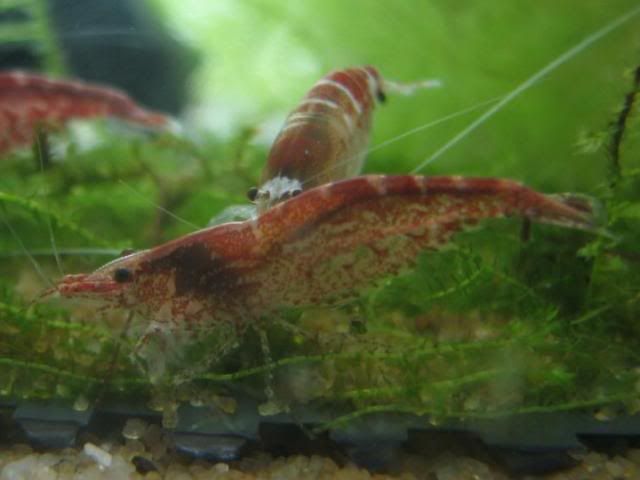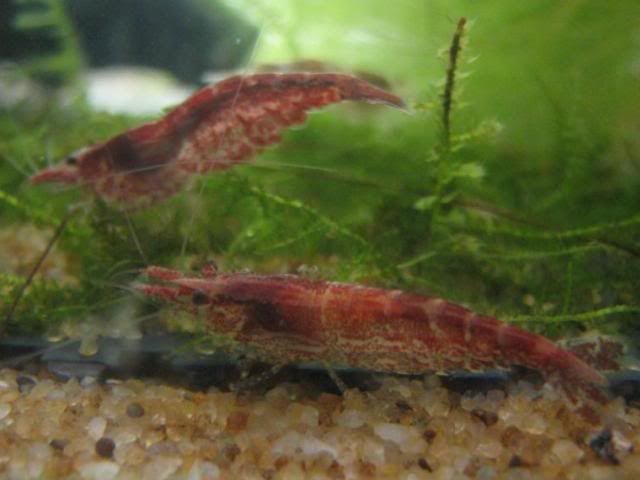Neocaridina denticulata Sinensis (Red) Lets see Yours
Moderator: Mustafa
- The Fisherman
- Shrimpoholic

- Posts: 380
- Joined: Thu Sep 07, 2006 12:49 pm
- Location: G.R. Michigan
- Contact:
- GunmetalBlue
- Shrimpoholic

- Posts: 263
- Joined: Sat Apr 16, 2005 11:10 am
- Location: CA
Hi John, this is really nice, seeing your well-colored RCS along with the others who have shared.  It's also interesting hearing ideas about certain commonalities in what's been observed about Cherries. I'd like to share some ideas and pictures too.
It's also interesting hearing ideas about certain commonalities in what's been observed about Cherries. I'd like to share some ideas and pictures too.
For example, a slightly colored shrimp such as the male RCS consists of spots, splotches and lines of red pattern on their carapace. To the naked eye, this shrimp appears pinkish. The smaller the shrimp is, the more "red" it appears because of the spacing between the clear to the red. The naked eye can't really pick up the spaces between the clear parts and the red parts. When the male becomes larger, my experience has NOT shown the male to become less red though in some sense, he might APPEAR less red because the naked eye can see a little better, the spacing between the splotches/lines of red color and the clear parts.
I also think it has to do with the fact that most of you have your males in with the females, who eventually (at least many) become more thoroughly covered with the "lace" pattern as they mature, and ultimately for some, continue on to get the thick/close-set red pattern that becomes basically, an opaque shell of red that's difficult to see through (a super red). Why do I bring this up? Because color is relative . It's the females that are becoming more red rather than the males becoming less red.
. It's the females that are becoming more red rather than the males becoming less red.
I'm probably one of the very few (if not the only) person who has had their males and female RCS living separately for about a year now. When I look in the all-male tank, due to color being relative, it is so easy to see the difference between the males with the good color and the males that are for the most part, clear. If I had females in there, the color difference between the males wouldn't be so apparent because the color curve would be thrown off by the females.
Now with all this said, where I recognize this line of thought that smaller=redder, larger=less red, is actually with the females. I have some females that are very small and dainty. They APPEAR to be insanely red! But I think in reality, they are no more red than my bigger females that have good color, it's just that the naked eye sees the smaller shrimp in a very compressed way.
Anyway, that's my 2 cents; there may be some flawed logic in there somewhere, but at the least, it's something to chew on.
This female has never been pregnant with fertile eggs. I think that if/when she does, she will have some great coloration. I'm trying to breed some of my RCS again before they all die off of old age! Most are already over a year old; I don't want to lose my line of RCS, I'm still only on the first generation.
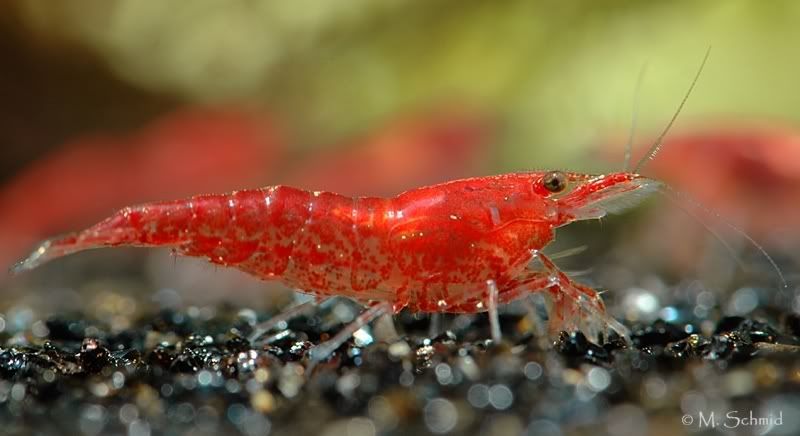
A different female, a different angle
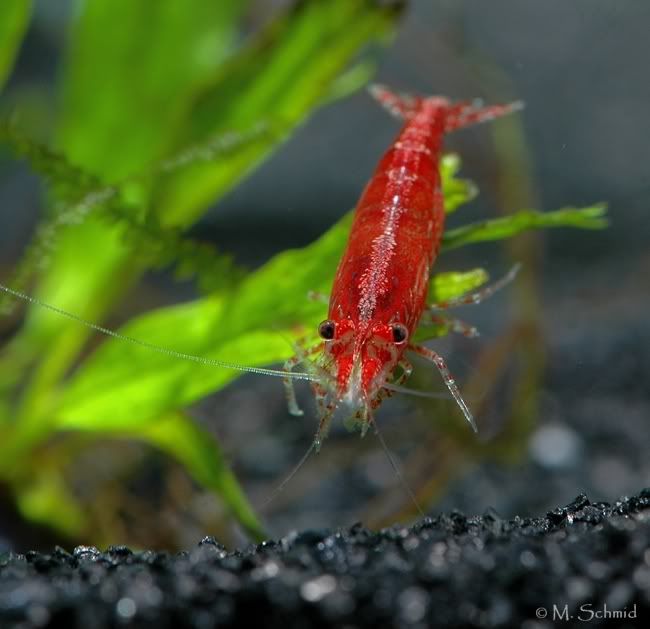
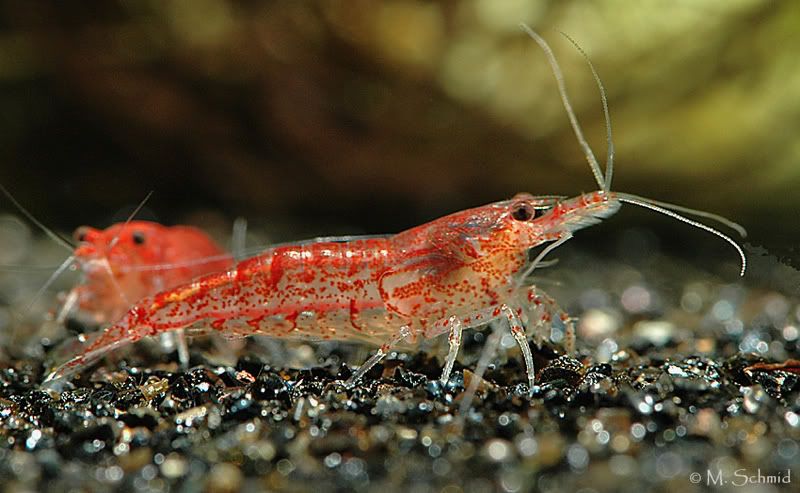
And two more male shrimp from my all-male tank
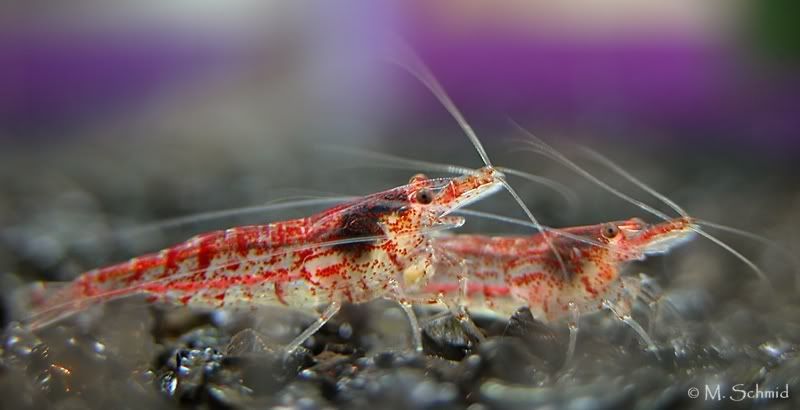
 . My original female, who I considered a super red had red legs too, except for at the joints, which were clear/white.
. My original female, who I considered a super red had red legs too, except for at the joints, which were clear/white.
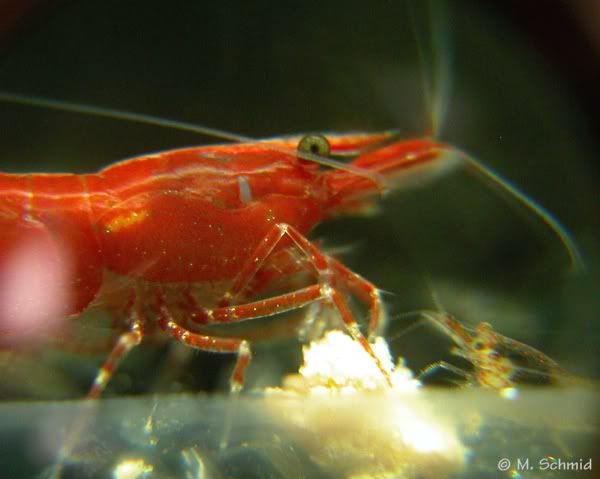
-GB
Mustafa wrote:My males have red on them, too. It's interesting, because my males are less red the bigger they get, quite in contrast to the females.
YuccaPatrol wrote:I have noticed that too: juvenile males have more color than the largest ones in my tank.
Since I have a little different way of looking at this subject, I'll go ahead and throw my viewpoint out there. Just so I don't misunderstand, it sounds like what's being said is that RCS males are more red when they are younger/smaller, and become less red as they become older/larger. My experience has not really proved this to be true in the literal sense, though I can understand they might "appear" to seem less red. I personally think that due to the way the human eye sees, they only "appear" to be less red due to the spacing of the red (along with other reasons).Newjohn wrote:I have also noticed , that the older the males get, the less the red shows up.
I thought I finialy had, niced colored males.
And then they grew up.
For example, a slightly colored shrimp such as the male RCS consists of spots, splotches and lines of red pattern on their carapace. To the naked eye, this shrimp appears pinkish. The smaller the shrimp is, the more "red" it appears because of the spacing between the clear to the red. The naked eye can't really pick up the spaces between the clear parts and the red parts. When the male becomes larger, my experience has NOT shown the male to become less red though in some sense, he might APPEAR less red because the naked eye can see a little better, the spacing between the splotches/lines of red color and the clear parts.
I also think it has to do with the fact that most of you have your males in with the females, who eventually (at least many) become more thoroughly covered with the "lace" pattern as they mature, and ultimately for some, continue on to get the thick/close-set red pattern that becomes basically, an opaque shell of red that's difficult to see through (a super red). Why do I bring this up? Because color is relative
I'm probably one of the very few (if not the only) person who has had their males and female RCS living separately for about a year now. When I look in the all-male tank, due to color being relative, it is so easy to see the difference between the males with the good color and the males that are for the most part, clear. If I had females in there, the color difference between the males wouldn't be so apparent because the color curve would be thrown off by the females.
Now with all this said, where I recognize this line of thought that smaller=redder, larger=less red, is actually with the females. I have some females that are very small and dainty. They APPEAR to be insanely red! But I think in reality, they are no more red than my bigger females that have good color, it's just that the naked eye sees the smaller shrimp in a very compressed way.
Anyway, that's my 2 cents; there may be some flawed logic in there somewhere, but at the least, it's something to chew on.
This female has never been pregnant with fertile eggs. I think that if/when she does, she will have some great coloration. I'm trying to breed some of my RCS again before they all die off of old age! Most are already over a year old; I don't want to lose my line of RCS, I'm still only on the first generation.

A different female, a different angle

Here's one of the males I've chosen to breed. He's actually one of my largest males, so for me anyway, the idea of older/larger having less coverage hasn't been true. In actuality, when I look in the tank, he doesn't really look like this per se, he basically looks pinkish and probably not very different from your and other people's more red males. Again, having to do with the naked eye not being able to see the shrimp in a magnified way.Newjohn wrote:Mustafa and everyone else
Do your Males have any color ?

And two more male shrimp from my all-male tank

Yes indeed, you've ... er, I mean your super reds have nice red legs all right! Those two super reds you've shown have great color coverage and are excellent looking breeders, MustafaMustafa wrote:Look at those red legs! Normal red cherries don't have such intensely red legs.

-GB
- The Fisherman
- Shrimpoholic

- Posts: 380
- Joined: Thu Sep 07, 2006 12:49 pm
- Location: G.R. Michigan
- Contact:
Thanks for the nice pictures, GB and John! 
GB, yes, you're probably right about our eyes playing some tricks on us. But it might also have something to do with the fact that sex develops *after* hatching from the eggs in many animals. I've had what turned out to be males later on, start out as *solid* red animals when they were small..not just little blotches of red close together but really solid red (I looked at them with a macro lens ). Something to think about.
). Something to think about.
GB, yes, you're probably right about our eyes playing some tricks on us. But it might also have something to do with the fact that sex develops *after* hatching from the eggs in many animals. I've had what turned out to be males later on, start out as *solid* red animals when they were small..not just little blotches of red close together but really solid red (I looked at them with a macro lens
Well I've had my shrimp for about 7months now and that's the only one that looks like that. I bought about 14 and now it's probably around 100 with just one that's that red, there's another one that's fairly red and has a really cool white stripe down the back, similar to what you see on the Bamboos... can't get a good shot yet though.Newjohn wrote:Ecir
Thank You for Sharing Your Photo.
How long have you been working on them ?
Or were lucky enough to buy them that way.
John
Ecir
- GunmetalBlue
- Shrimpoholic

- Posts: 263
- Joined: Sat Apr 16, 2005 11:10 am
- Location: CA
Thanks for the kind comments, Badflash and Puffer John  .
.
 . I can't even begin to imagine how amazing it would be to see a huge colony of shrimp ... and it will also be interesting to see the progress you make on your selective breeding program.
. I can't even begin to imagine how amazing it would be to see a huge colony of shrimp ... and it will also be interesting to see the progress you make on your selective breeding program.
Also, my personal experience so far is, I haven't seen "solid" red RCS when they are young (though I didn't have the benefit at the time of dark substrate, so a piece of my personal findings is incomplete, but I'll certainly watch for it in any future hatchings). When discussing a "solid red" shrimp, I think of an older female that gets to the point that their shell seems to lose translucence and it becomes a seemingly more "permanent" part of their color in that they might still vary in shade, like a lighter and brighter red or a darker, blood, or even an almost fushia red, but due to a more opaque shell, they don't seem to be able to "turn" it off. To my knowledge, I don't think anyone's male has this opaqueness, young or old. I haven't seen very young females with this trait either - so hopefully you can understand the skepticism expressed. Next time you see a young shrimp that is solid red, you should try and get a picture and document his or her (whichever way the shrimp ends up leaning ) age.
) age.
Now, I too, had a somewhat similar experience, but again, coming from the other way around: Months and months after having split my RCS into all-male and all-female tanks, I had one shrimp in the all-male tank develop a saddle!!! I thought for sure I would be announcing there is protandry in RCS ... but logic got the better of me and I figured s/he was a VERY late bloomer. My records told me that the very last breeding and hatching of my RCS was 8 months previous, so she was at least 8 months old, if not older, before developing a saddle. Protandry or late bloomer?! You decide.
When you say you looked at them with a macro lens, do you mean through a camera lens? You won't actually see that kind of magnified detail unless you've got a viewfinder the size of a computer monitor, so you'll need to actually TAKE the picture . A powerful magnifying glass might be a different story ... but we'd like to see and consider the possibilites.
. A powerful magnifying glass might be a different story ... but we'd like to see and consider the possibilites.
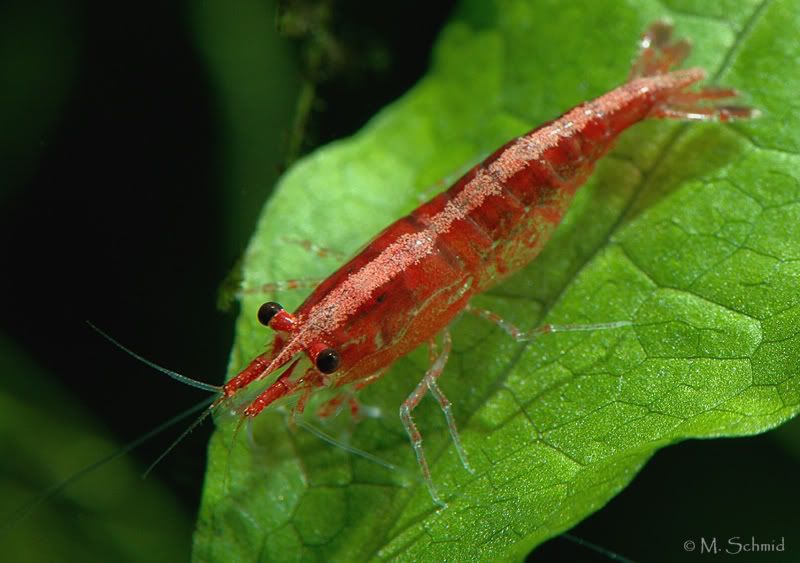
-GB
They look great, John! Wow, a 125gal tank, huh? That would be like having more water than air space at my placeNewjohn wrote:Here are a few photo's of my best colored Females. They are in a 125gal. They will have alot of space to multiply.
Mustafa, is this what's called protogyny, or is this a completely different process? And do you know for a fact that this takes place with RCS? I do remember you mentioning separating out young "red" RCS, only to find them turning less red ... unfortunately, I can't quite remember if you were separating male shrimp or female shrimp and don't know what method you used. Like how would you know what sex they were if they were young, and whether some of them in the group went on to become females, something I would entirely expect when splitting them by color, before they mature.Mustafa wrote:But it might also have something to do with the fact that sex develops *after* hatching from the eggs in many animals. I've had what turned out to be males later on, start out as *solid* red animals when they were small..not just little blotches of red close together but really solid red (I looked at them with a macro lens).
Also, my personal experience so far is, I haven't seen "solid" red RCS when they are young (though I didn't have the benefit at the time of dark substrate, so a piece of my personal findings is incomplete, but I'll certainly watch for it in any future hatchings). When discussing a "solid red" shrimp, I think of an older female that gets to the point that their shell seems to lose translucence and it becomes a seemingly more "permanent" part of their color in that they might still vary in shade, like a lighter and brighter red or a darker, blood, or even an almost fushia red, but due to a more opaque shell, they don't seem to be able to "turn" it off. To my knowledge, I don't think anyone's male has this opaqueness, young or old. I haven't seen very young females with this trait either - so hopefully you can understand the skepticism expressed. Next time you see a young shrimp that is solid red, you should try and get a picture and document his or her (whichever way the shrimp ends up leaning
Now, I too, had a somewhat similar experience, but again, coming from the other way around: Months and months after having split my RCS into all-male and all-female tanks, I had one shrimp in the all-male tank develop a saddle!!! I thought for sure I would be announcing there is protandry in RCS ... but logic got the better of me and I figured s/he was a VERY late bloomer. My records told me that the very last breeding and hatching of my RCS was 8 months previous, so she was at least 8 months old, if not older, before developing a saddle. Protandry or late bloomer?! You decide.
When you say you looked at them with a macro lens, do you mean through a camera lens? You won't actually see that kind of magnified detail unless you've got a viewfinder the size of a computer monitor, so you'll need to actually TAKE the picture
An interesting thing to note is that for my shrimp anyway, the stripe seems to be one of the last things to appear, even taking over say, 6+ months before it shows up. And the ratio hasn't been all that high either; it seems to be less than 5% of the population that developed the stripe (though their mother had it). Here's my humble entry; the stripe looks cooler when seen in person.Ecir wrote:there's another one that's fairly red and has a really cool white stripe down the back, similar to what you see on the Bamboos... can't get a good shot yet though.

-GB
-
AnneRiceBowl
- Shrimpoholic

- Posts: 327
- Joined: Sun Apr 16, 2006 8:00 pm
- Location: Omaha, NE, USA
- Contact:
Wow. I really need a new camera. My pics look like what ends up in the water change bucket after a gravel vac compared to some of those.
So.....with my head hung low and my tail between my legs, here are a few random pics of my RCS in my planted 30 gallon long. I had just traded about 1/2 of my RCS to expand the gene pool, so most of them (at the time of the pics) had not colored up, yet. I'm working on some new pics:





Size comparison with a Singapore shrimp:

So.....with my head hung low and my tail between my legs, here are a few random pics of my RCS in my planted 30 gallon long. I had just traded about 1/2 of my RCS to expand the gene pool, so most of them (at the time of the pics) had not colored up, yet. I'm working on some new pics:





Size comparison with a Singapore shrimp:










